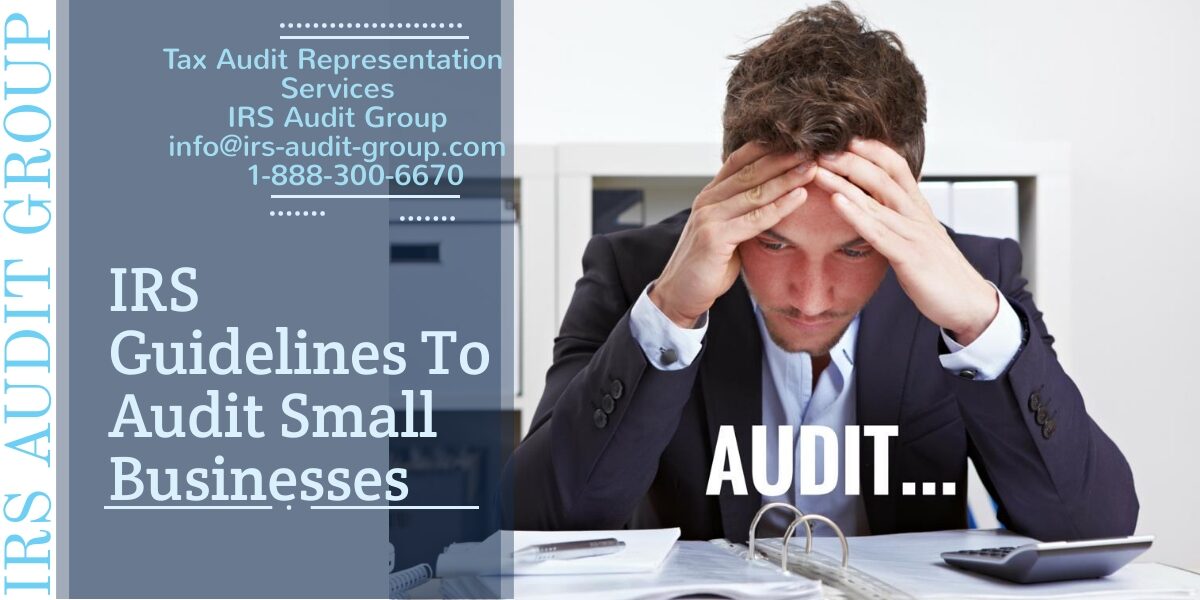IRS agents are trained on specific audit techniques for different industries. The guides that these agents are trained to use are referred to as Audit Techniques Guides (ATGs), and they focus on providing guidance for examiners in different market segments. These guides are so crucial to the IRS because they create consistency in their audits, since everyone is using the same guidelines.
The ATGs usually consist of; common and rare industry issues, techniques for examinations, jargon for that particular industry, business practices, and any other information that can assist them in the examination process.
Once you receive a notice of an IRS audit, it would be wise to review the ATG for your industry in depth with your representative. The reason any business owner can find value in these guides is due to the abundance of information you can find. The audit target will give you an advanced view of what to expect in the exam, that way you can prepare a strong defense instead of walking into the exam blind. These documents even give the revenue agent resources within the IRS database to find out; credit scores, currency transaction reports, and information returns that were provided to the taxpayer by third parties.
And if you’re thinking about trying to hide sources of income, think again. These reports are so in depth, that they provide methodologies for finding any cash income that went unreported. So, to ensure the best possible outcome in the case of an audit, it’s essential for the taxpayer to perform a thorough review of the appropriate ATG.
The guides below can be viewed at the IRS website address: Remember to find the most appropriate guideline for your business.
NOTE: The dates that these guides were issued are shown next to them. These guides are up to date as of October, 2016.
https://www.irs.gov/businesses/small-businesses-self-employed/audit-techniques-guides-atgs
1. Aerospace Industry; 01/05
2. Air Transportation; 04/08
3. Architects and Landscape Architects; 08/2011
4. Art Galleries – Audit Technique Guide; 01/2012
5. Attorneys Audit Technique Guide; 03/2011
6. Business Consultants; 07/2011
7. Capitalization v Repairs; 11/2010
8. Cash Intensive Businesses; 04/2010
9. Child Care Provider; 03/09
10. Coal Excise Tax; 05/05
11. Commercial Banking; 5/01
12. Conservation Easement; 11/2011
13. Continuation of Employee Healthcare Coverage; 03/2012
14. Construction Industry; 05/09
15. Cost Segregation; 01/14/05
16. Credit for Increasing Research Activities (i.e. Research Tax Credit) IRC§41; 06/05
17. Entertainment Audit Technique Guide; 10/2015
18. Equity (Stock) – Based Compensation Audit Techniques Guide; 08/2015
19. Excise Tax on Indoor Tanning; 7/2012
20. Executive Compensation – Fringe Benefits; 02/04/05
21. Factoring of Receivables; 06/06
22. Farmers; 07/06
23. Fishing Audit Technique Guide; 08/2011
24. Foreign Insurance Excise Tax; 04/08
25. Golden Parachutes; 02/04/05
26. Hardwood Timber Industry; 12/2012
27. IC-DISC Audit Guide: 03/2012
28. Inland Waterways: 12/08
29. IRC 162(m) Salary Deduction Limitation: 02/04/05
30. IRC § 183: Activities Not Engaged in For Profit: 06/19/09
31. The Laundromat Industry: 6/00
32. Lawsuit Awards and Settlements: 01/11
33. Low-Income Housing Credit – Guide for Completing Form 8823: 08/2015
34. Ministers: 04/23/09
35. New Markets Tax Credit: 05/2010
36. New Vehicle Dealership Audit Technique: 1/05
37. Non-Qualified Deferred Compensation: 06/15
38. Obligations Not in Registered Form: 6/06
39. Obligations Not in Registered Form D: 06/2006
40. Oil and Gas Industry: 5/96
41. Ozone Depleting Chemicals (ODC) Excise Tax: 9/07
42. Partnerships: 3/08
43. Passive Activity: 02/05
44. Placer Mining: 7/99
45. The Port Project: 8/95
46. Real Estate Property Foreclosure and Cancellation of Debt: 2/15
47. Reforestation: 8/95
48. Rehabilitation Tax Credit: 12/02
49. Research Credit Claims: Credit for Increasing Research Activities §41: 5/08
50. Retail Industry: 2/09
51. Sections 48A and 48B – Advanced Coal and Gasification Project Credits: 5/09
52. Split Dollar Life Insurance: 3/05
53. Wine Industry: 05/2011
Simply put, it will be in the taxpayers’ best interest to thoroughly review these ATGs with their representative when the IRS decides to open an audit.

